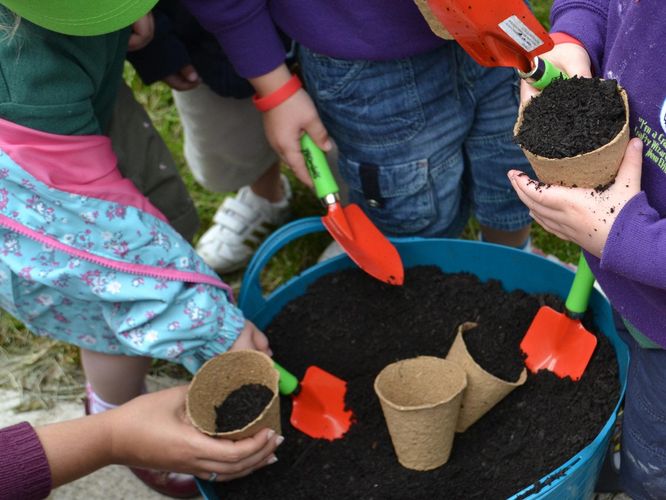Researchers at the University of Greenwich (an EAUC Member) have found that f...
Researchers at the University of Greenwich (an EAUC Member) have found that food growing in schools makes an “incredible difference” to children's lives, but schools want more support to integrate food growing into every day school life.
Funded by the BIG Lottery, the ‘Taking the Pulse: Maintenance and Sustenance’ project, run by the Natural Learning and Environments Centre at The University of Greenwich aims to deliver an in-depth snapshot of how growing takes place, share models that have worked well and link up schools to share best practice. Surveys sent out to schools have begun to clarify the positive impact of food growing but they also show schools’ needs and challenges to maintain food-growing activities.
Food-growing schools grow a wide range of produce, from strawberries to aubergines and garlic. Around a third of those schools prepare and eat their produce in class, while around a third uses their produce for school lunches. Respondents are very clear about the benefits of growing food, such as encouragement to pupil’s learning and improvement to their well-being and healthy eating habits. 85% of participants use growing as part of the science curriculum but half of all respondents feel that a more creative curriculum for food growing would improve their growing activities. 80% would like more support for growing food, funding support in particular. Almost the same percentage is interested in creating community networks and local relationships for food growing.
“These results are really exciting,” says the project’s leader, Dr Jennifer Patterson, “but the stories on the ground also demonstrate the need for empirical research because growing food is making an incredible difference to children’s lives. There is evidence of new pedagogy as depending on how food growing takes place. It can be used all across the curriculum to increase pupil’s engagement and attainment.”
The Maintenance and Sustenance project is focussing at present on the Boroughs of Southwark and Royal Greenwich, mainly Primary schools, but is interested from responses from everywhere. As Dr Patterson says: "We hope to hear more from schools who are not growing food about the challenges they face. Many schools, especially in the city, also simply do not feel they have the space or time to grow food, but the links between childhood obesity rates, disadvantage and nutritional understanding show that practices around growing food in schools should be a high priority.”
To participate in the survey, you can go to tinyurl.com/growingfoodinschools. The next stage of the project will involve detailed case studies and focus groups. To celebrate the launch of the project report, there will be a free afternoon of inspirational talks around food growing in schools at Greenwich Maritime Campus on 19 March 2014 4pm to 6pm with food and wine.
To attend or for any questions, contact Dr Jennifer Patterson on [email protected].
Funded by the BIG Lottery, the ‘Taking the Pulse: Maintenance and Sustenance’ project, run by the Natural Learning and Environments Centre at The University of Greenwich aims to deliver an in-depth snapshot of how growing takes place, share models that have worked well and link up schools to share best practice. Surveys sent out to schools have begun to clarify the positive impact of food growing but they also show schools’ needs and challenges to maintain food-growing activities.
Food-growing schools grow a wide range of produce, from strawberries to aubergines and garlic. Around a third of those schools prepare and eat their produce in class, while around a third uses their produce for school lunches. Respondents are very clear about the benefits of growing food, such as encouragement to pupil’s learning and improvement to their well-being and healthy eating habits. 85% of participants use growing as part of the science curriculum but half of all respondents feel that a more creative curriculum for food growing would improve their growing activities. 80% would like more support for growing food, funding support in particular. Almost the same percentage is interested in creating community networks and local relationships for food growing.
“These results are really exciting,” says the project’s leader, Dr Jennifer Patterson, “but the stories on the ground also demonstrate the need for empirical research because growing food is making an incredible difference to children’s lives. There is evidence of new pedagogy as depending on how food growing takes place. It can be used all across the curriculum to increase pupil’s engagement and attainment.”
The Maintenance and Sustenance project is focussing at present on the Boroughs of Southwark and Royal Greenwich, mainly Primary schools, but is interested from responses from everywhere. As Dr Patterson says: "We hope to hear more from schools who are not growing food about the challenges they face. Many schools, especially in the city, also simply do not feel they have the space or time to grow food, but the links between childhood obesity rates, disadvantage and nutritional understanding show that practices around growing food in schools should be a high priority.”
To participate in the survey, you can go to tinyurl.com/growingfoodinschools. The next stage of the project will involve detailed case studies and focus groups. To celebrate the launch of the project report, there will be a free afternoon of inspirational talks around food growing in schools at Greenwich Maritime Campus on 19 March 2014 4pm to 6pm with food and wine.
To attend or for any questions, contact Dr Jennifer Patterson on [email protected].











